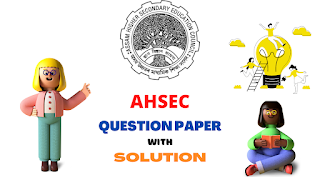AHSEC| CLASS 12| ECONOMICS| QUESTION PAPER - 2024| H.S. 2ND YEAR
2024
ECONOMICS
(For new course Students)
Full Marks: 80
(Part-A = 40 + Part-B = 40)
Pass Marks: 24
(For Old Course Students in lieu of
Project Works)
Full Marks: 100
(Part-A = 40 + Part-B = 40 + Part-C =
20)
Pass Marks: 30
Time: Three hours
[The who appeared till H.S. Final
Exam - 2023 have been treated as Old Course students]
The figures in the margin indicate
full marks for the questions.
PART-A
1. Answer any four of the following questions: 1x4=4
(i)
What is intermediate good?
(ii)
If MPS = 1, what is the value of MPC?
(iii)
Primary Deficit = Fiscal Deficit - ________. (Fill in the blank)
(iv)
Which one of the following is not a quantitative credit control measure of the
central bank?
(a) Bank rate
(b) Open market operation
(c) Variable reserve ratio
(d) Direct control
(v)
Write one merit of flexible exchange rate.
(vi)
What is GDP deflator?
2. Answer any five of the following
questions: 2x5=10
(i)
Differentiate between capital expenditure and revenue expenditure.
(ii)
What are the components of high-powered money?
(iii)
What are the transactions that are included in the capital account of balance
of payments?
(iv)
Define personal Income and personal disposable Income.
(v)
As a result of increase in investment by Rs. 125 crores, national income
increases by 500 crores. Calculate the value of the multiplier.
(vi)
Distinguish between stock and flow.
(vii)
Write any two implications of revenue deficit.
3. Answer any two of the following
questions: 3x2=6
(i) Write any three limitations of barter system.
(ii) What is balance of payments deficit? Write two causes of
balance of payments deficit.
(iii) Write a short note on:
Autonomous and Induced Investment.
(iv) What is a government budget? What are the components of
government budget?
4. Answer any two of the following:
6x2=12
(i) Discuss the motives of demand for money? What is liquidity trap?
5+1=6
(ii) Briefly discuss the income method of calculating national
income. From the following data calculate Gross National Product at market
price (GNPMP).
(In Rupees crore)
(i) Mixed income of self-employed - 400
(ii) Compensation of employees - 500
(iii) Net factor income from abroad - (-20)
(iv) Net Indirect Taxes - 100
(v) Consumption of fixed capital - 120
(vi) Profits - 350
(vii) Rent - 100
(vii) Interest - 150
(iii) Discuss the functions of commercial bank.
(iv) Define aggregate demand and aggregate supply. Complete the
following table and determine the equilibrium level of income: 2+4=6
|
Aggregate Supply (AS) |
Consumption (C) |
Savings (S) |
Investment (I) |
Aggregate Demand (AD) |
|
900 800 700 600 500 400 300 200 100 |
780 700 620 540 460 380 300 220 140 |
|
40 40 40 40 40 40 40 40 40 |
|
5. Answer any one of the following:
(i)
What is fiscal policy? Discuss the impact of changes in government expenditure
and changes in taxes on equilibrium income. 2+3+3=8
(ii)
Explain the determination of exchange rate under flexible exchange rate system.
(iii) Write short notes on: 4+4=8
(a) Demonetisation
(b) Fiscal Responsibility and Budget Management Act, 2003
PART-B
6. Answer any four of the following
questions: 1x4=4
(i) What is underdeveloped economy?
(ii) In which year World Trade Organisation (WTO) was formed?
(iii) Write the full form of SHG.
(iv) Write one objective of NITI Aayog.
(v) Golden revolution was related to -
(a) fish production
(b) horticulture production
(c) milk production
(d) agriculture production (Choose the correct option)
(vi) Define privatisation.
7. Answer any five of the following
questions: 2x5=10
(i) Mention two non-institutional sources of rural credit.
(ii) Write two long-term goals of Five-Year Plans of India.
(iii) Mention two types of unemployment prevalent in the agriculture
sector of India.
(iv) What is the importance of green revolution in the Indian agriculture?
(v) Write two positive effects of LPG policies in the Indian
economy.
(vi) Write two merits of globalisation.
(vii) Mention two objectives of disinvestment.
8. Answer any two of the following
questions: 3x2=6
(i) Write a note on Industrial Policy Resolution, 1956.
(ii) Briefly discuss any one serious environmental problem India is
facing at present time.
(iii) Discuss the composition of India's foreign trade on the eve of
independence.
(iv) Explain the role and importance of education in human capital
formation.
9. Answer any two of the following
questions: 6x2=12
(i) Write a comparative note for India, China and Pakistan on the
basis of -
(a) Demographic indicators
(b) Human development indicators
(ii) Briefly discuss the challenges India is facing in the context
of employment.
(iii) What is economic reform? Explain the need for economic reforms
in India. 1+5=6
(iv) Outline the common development successes and failures of India
and Pakistan. 3+3=6
10. Answer any one of the following:
8x1=8
(i) What do you understand by agriculture marketing system? Discuss
government measures to improv agriculture marketing system in India. 2+6=8
(ii) Analyse the concept of sustainable development. Also discuss
the strategies for sustainable development. 4+4=8
PART-C
(For
Old Course Students in lieu of Project Works)
11. Answer any four of the following
questions: 5x4=20
(i) Write a critical note on public debt.
(ii) Discuss the sources of demand for foreign currency.
(iii) Can GDP be used as an index of country's welfare? Justify your
answer.
(iv) What is human capital? Discuss the sources of human capital.
(v) Briefly write about India as a knowledge economy.
(vi) Discuss the circular flow of national income in a simple
economy.
***
ECONOMICS SOLVED PAPERS PAGE LINK - Click here
BUY E-BOOK (PDF FILE)
[TO SEE FULL SOLUTION]
(Chapter wise Notes, Exam Question Papers solved, MCQ solved) [ARTS, COMMERCE, SCIENCE]
|
DOWNLOAD PAGE LINK:-CLICK HERE |
AHSEC PAGE LINK - CLICK HERE

